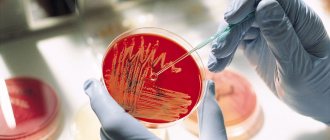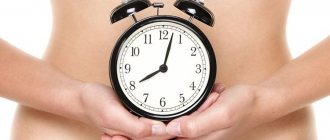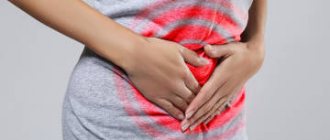Where and what kind of swelling occurs?
Swelling can appear only in the limbs or throughout the body, including the face. With a slight deviation of hormones from the norm, there is a slight increase in body weight - up to 2 kg, coarsening of the mammary glands and their increased sensitivity. In this case, swelling disappears on its own before menstruation.
With severe hormonal imbalances, ovulation in women occurs with significant weight gain - over 3 kg and swelling of the face. Unpleasant symptoms may persist until the end of the menstrual period. The condition, in addition to swelling of the body, may be accompanied by neurological disorders and cardiovascular problems. In the absence of drug treatment, signs of swelling during ovulation will appear more intense each time.
Reasons for appearance
The exact causes of the problem have not been identified. All versions of doctors are speculative. Among the main factors contributing to the appearance of the symptom are:
- Increased estrogen levels. The maximum level of the hormone is observed during the maturation of the egg. It is believed that the substance retains sodium salts in the body. Because of this, fluid accumulates in the tissues. If estrogen significantly deviates from the norm, swelling of the face and abdomen is observed during ovulation.
- Progesterone deficiency. This hormone is characterized by natriuretic properties. Typically, excess estrogen is observed in parallel with insufficient production of progesterone. These physiological processes are synergistic with respect to each other.
- Increase in the hormone prolactin. It has been scientifically proven that prolactin, like estrogen, has the ability to accumulate sodium and fluid. When there is an excess of a substance in the body, normal fluid excretion is disrupted.
Reasons for fluid retention in the body not related to ovulation include:
- Stressful situations and psycho-emotional stress. These conditions provoke increased production of the hormone ACT. This substance controls the degree of absorption of fluid by the body.
- Lack of vitamins B, E, A and some microelements. The substances do not have a direct effect on the occurrence of swelling. The level of some female sex hormones, for example, prostaglandins, depends on their amount in the body. They influence the processes of ovulation and its symptoms.
The causes of swelling before menstruation have been revealed
Before the days that are called “critical,” most women feel “not at their best.”
The stomach and lower back hurt, dizziness, nausea occur, heart rate increases, skin rashes appear, and sudden mood swings, irritability and a tendency to depression have become almost the norm.
Unfortunately, such conditions become the subject of inappropriate jokes: premenstrual syndrome (PMS) has long been the talk of the town, although one should not joke about health.
Normal physiological processes should proceed calmly, although doctors consider some discomfort acceptable: after all, hormonal changes. Today we will talk about such an unpleasant companion of critical days as swelling before menstruation. Is this the norm or a deviation? What should I do and how can I, if not completely get rid of it, reduce swelling before menstruation?
Why does swelling occur before menstruation?
Swelling before menstruation is a common manifestation of PMS. A few days before menstruation, they appear in the vast majority of women, but medical science cannot yet explain the reasons. A woman is a mystery not only for science, and it is hardly worth demanding exact answers, but there are many assumptions.
Estrogens, sex hormones produced by ovarian follicles, are considered the main “culprits,” although no specific evidence has been received: it is assumed that they retain sodium in the cells and fluid is also retained - hence the swelling. At the same time, it is rarely mentioned that estrogen levels are high not before menstruation itself, when swelling appears, but in the middle of the cycle.
It is also believed that at this time the level of progesterone, a hormone produced by the corpus luteum of the ovary and performing many functions, drops (progesterone is responsible for the normal cycle, endometrial renewal and the ability to become pregnant; removes excess sodium, having a diuretic effect).
Before the onset of menstruation, the level of progesterone increases and decreases before the onset of menstruation; During menstruation, the body produces very little of it.
However, swelling also goes away with the onset of menstruation; Progesterone cannot be “blamed for everything,” but it is still generally accepted that a decrease in its level contributes to the accumulation of sodium.
At the same time, prolactin, which is responsible for the production of breast milk, “comes onto the scene”: the egg is ripe, which means it is necessary to act. It can also retain fluid, especially if the cells are sensitive to it.
Another hormone, ACTH, affects the production of estrogen and progesterone, and during stress the pituitary gland produces more of it: this also has a direct bearing on fluid retention.
The other side is associated with a lack of vitamins and minerals and an excess of harmful substances, but this topic is too broad.
Let us briefly recall: in many women, PMS manifests itself in an increase in appetite (this is normal - the body “reserves” in case of pregnancy) and an exacerbation of taste preferences.
Modern people have a lot of the latter, with an abundance of all sorts of “sweets” and ready-made products: it’s easy to get used to and difficult to give up.
Often, before menstruation, women “allow” themselves spicy and salty, smoked and fatty foods: the body is already prone to swelling, and then there are these “supplements”. Sweets and fatty milk, baked goods and canned marinades also contribute to the accumulation of water - especially against the background of stress, which is often “eating” during the manifestations of PMS.
At the same time, you don’t want to move, there is a desire to “lie down in a warm hole” - also “intended by nature” - and feast on something: activity decreases - fluid is retained in the tissues.
Another opinion, not without foundation: by accumulating, the liquid protects the female body from dehydration, which is possible due to blood loss during menstruation - nature also took care of it. Nutrients are also removed from the blood - for example, B vitamins and iron: a protective mechanism does not seem superfluous.
This is fine?
And there are more questions than answers here; Moreover, not all women experience swelling before menstruation. Experts explain: in most cases, this reaction of the body is natural, as a response to hormonal changes. After menstruation, hormonal levels normalize and swelling goes away, but not for everyone: more often they remain in those who belong to “risk groups”.
These are women who are overweight - estrogens accumulate in adipose tissue - and have an irregular cycle; those suffering from chronic diseases of the female genital area (polyps, cysts, endometriosis, etc.
), heart and blood vessels, gastrointestinal tract, liver and kidneys; taking hormonal contraceptives; teenage girls and women over 40 years old.
The predisposition to edema increases sharply with poor nutrition, frequent consumption of foods with phytoestrogens, an inactive lifestyle, physical and emotional overload and a tendency to bad habits.
How do they manifest themselves?
Not only your feet can swell - your shoes become too small, but also your hands and face - there are “bags” and puffiness under the eyes. Often the chest and abdomen swell, and sometimes the entire body - more often with problems with the kidneys.
In the evening, swelling before menstruation is more noticeable, especially during sedentary or standing work. But for some they are more pronounced in the morning: it has been noted that many “treats” and “delicacies” contribute to fluid retention.
What to do?
Is it possible to avoid swelling before menstruation completely? It is possible, but you will have to radically change your lifestyle - in particular, it would be good to take a rest for a few days before your period. Not everyone will be able to stay away from work at this time, but it is quite possible to improve water-salt metabolism: swelling will be either insignificant or almost unnoticeable.
To reduce swelling before menstruation, add more clean water to your diet, up to 1.5-2 liters depending on your body type, but try to drink less in the 2nd half of the day; sodium will dissolve and be removed from the tissues. Green and herbal teas will also help; It’s better not to drink coffee yet, despite its diuretic effect: there will be more harm than good. Because due to the diuretic effect of coffee, the body tries to retain fluid.
It is better to structure the diet so that there are no excesses at all, but at least a week before menstruation, remove foods that upset the balance: smoked meats, fried foods, animal fats, sweets, reduce the amount of salt, add more fresh vegetables, fruits and herbs, such as cucumbers, watermelon and fennel. If you are overweight, this is especially important: the caloric content of your diet needs to be reduced.
Gymnastics and walking will also protect against swelling before menstruation. Exercise calmly and regularly: this will help the normal functioning of all organs and systems.
It is useful to swim or just take a warm (not hot!) bath: urination will increase.
But you can’t go on diets or strict fasting days in the 2nd half of the cycle: the body is tuned to “storing” nutrients, and limiting them can provoke fluid accumulation.
Fighting the problem
Swelling during ovulation should not be ignored, despite the fact that this is a temporary condition. There are many ways to combat swelling. The most effective of them is taking hormonal drugs that correct the level of estrogen in the body.
Useful tips
Some tips will help eliminate swelling quickly and safely. During ovulation, women are advised to:
- Stick to a diet. For a few days, meat is excluded from the diet and preference is given to poultry or white fish. The menu is enriched with fresh vegetables and fruits, which contain magnesium and potassium. During ovulation, it is advisable to consume less salt.
- Increase the amount of fluid consumed. The opinion that during edema one should reduce water consumption is erroneous. Without enough liquid, it is impossible to wash away the salts that caused the problem. Preference is given to fruit drinks and compotes without added sugar. Limit the consumption of drinks containing caffeine.
- Do daily stretching exercises. Gymnastics helps improve blood circulation and stimulates metabolic processes in the body. During exercise, excess fluid is removed from the muscles.
Medicines
To combat swelling during ovulation, various medications are used, but the main emphasis is on oral contraceptives. It is desirable that the selected hormonal agents have a diuretic effect.
You can also minimize the symptoms of swelling during ovulation:
- Contraceptive drugs - Norkolut, Duphaston. Recommended for use in the middle of the cycle.
- Drugs that correct the level of prolactin in the body - Dostinex, Parlodel. A decrease in hormone levels leads to a decrease in the severity of the problem.
- Vitamin complexes - Time factor. Due to a lack of essential microelements, the balance of hormones in the body is disrupted and signs of swelling on the face and body worsen.
- Diuretics - Veroshpiron. Prescribed in phase 2 of the menstrual cycle and promote the rapid removal of excess fluid from tissues.
- Homeopathic medicines and biological food additives – Mastodinon, Cyclodinone. The therapeutic effect of the drugs has not been proven. But patients who have used medications in this group note their effectiveness in the fight against edema.
I swell after ovulation
Ovulation is the period when a mature egg is released from the ovary for favorable fertilization. It occurs in the middle of the menstrual cycle, approximately on days 14-16, and is accompanied by certain symptoms, including swelling.
In the article we will tell you why swelling occurs, which parts of the body it affects, whether it is normal or requires a visit to the doctor, and whether this unpleasant condition can be avoided.
Can a woman swell during this period?
Swelling during ovulation is a completely common phenomenon that every woman encounters every month. Due to changes in hormonal levels, ovulation may be accompanied by mild pain in the lower abdomen, swelling of the mammary glands, slight discharge, weight gain and swelling.
Where can swelling occur?
Normal physiological swelling during ovulation can occur in the arms, legs, face, and throughout the body. They can be either completely unnoticeable or reach a weight gain of up to 2 kg, which is also within the normal range.
A deviation from the norm is considered to be a weight gain of more than 3 kg or severe, prolonged swelling of the face and limbs, or deterioration in health.
Edema may indicate serious hormonal imbalances, problems of the cardiovascular system and other disorders in the body.
Signs and symptoms
Swelling during ovulation can be both obvious and hidden.
Obvious swelling is visible to the naked eye, for example - morning swelling of the face and eyes, the appearance of indentations from underwear on the skin, marks from socks (with the exception of tight elastic socks).
You can check them yourself by pressing on the swollen area with your finger - if there is swelling, a mark will remain. The skin over the swelling usually becomes slightly shiny.
Sometimes they can be noticed in the evening, when the usual shoes are difficult to put on due to swelling of the ankle and lower leg; You may feel tired in your legs.
Hidden edema in the body can only be determined by regular weighing or monitoring daily diuresis: the volume of urine excreted per day is correlated with the volume of all fluid consumed per day . In this case, all liquid entering the body is taken into account (pure water, teas, coffee, soups); Normally, urine should be excreted in the amount of about 75% of the total amount of fluid consumed.
Treatment
Physiological swelling, as a rule, does not require special treatment, as it goes away on its own by the end of the cycle. But you can alleviate the condition by following some recommendations:
- Increasing the amount of fluid consumed . To cleanse the body of accumulated salts and remove excess fluid, it is necessary to consume large amounts of clean water, unsweetened fruit drinks and compotes.
- Diet . To avoid swelling, at the expected time of ovulation it is recommended to give up salt and meat (white fish and poultry are allowed) and eat more fresh vegetables and fruits, nuts, dried fruits rich in magnesium and potassium (almonds, cashews, peas, dried apricots, prunes, avocados, bananas etc.).
- Daily light physical activity . Morning exercises, gymnastics, or just stretching improve blood circulation and metabolic processes in the body, which helps eliminate excess fluid.
If swelling begins to cause discomfort or becomes pathological, you can resort to the help of medications or traditional medicine.
Folk remedies
Traditional medicine recipes are often used in combination with therapeutic treatment:
- Ice prepared from decoctions (sage, linden, geranium, yarrow, thyme, oak bark, plantain) will help eliminate swelling on the face.
- The infusion is prepared at the rate of 1 tablespoon of dry ingredient per 200 ml of boiling water.
- Leave for 3 hours.
- Then filter and pour into ice trays.
Rub the prepared ice over your face for 5 minutes.
- A cabbage mask is no less effective for relieving swelling on the face - fresh leaves are crushed into a paste and applied to the face for 15 minutes.
- Swelling on the eyelids can be eliminated by cutting slices of fresh cucumber or cotton pads soaked in green tea.
- You can relieve swelling in your legs using a special bath:
- pour warm water into a basin;
- add a tablespoon of honey, soda and salt;
- lower the legs for 10 minutes, then dry thoroughly.
Repeat baths twice a day. For oral administration, decoctions of rose hips or anise seeds are suitable.
- To prepare a rosehip decoction, simply pour boiling water over the berries and leave for an hour; Take the decoction throughout the day.
- Anise infusion is prepared as follows: 4 tablespoons of seeds are poured into a glass of boiling water, boiled for 8 minutes, then filtered. The decoction is taken three times a day before meals, 2 tablespoons.
Source: https://vsedlyavasdamy.ru/info/otekaju-posle-ovuljacii/
Why is swelling observed during ovulation?
Every month, the reproductive system prepares for a potential pregnancy.
The follicle develops, then an egg emerges, mature and ready for fertilization by a sperm.
She moves through the fallopian tubes to the uterus, where the sperm awaits her. Then estrogen levels rise sharply. Because of it, fat mass accumulates.
If fertilization does not occur and the egg dies without merging with the sperm, the woman begins her period. The endometrium is excreted along with the blood.
During this process, small blood vessels are constantly ruptured. All the useful substances that were prepared for the attachment and further development of the embryo come out. That is why the color of the blood released is brownish or red.
It must be said that there is no reason to panic here. The reproductive system is simply being updated. If you weigh yourself the day before the start of the corpus luteum phase, you may notice plus one or even two kilograms. But don't worry. Most likely, in a couple of days everything will stabilize, and the scales will show the previous numbers.
Attention! Swelling during ovulation appears due to many factors: heredity, age, bad habits, etc.
Weight fluctuations during the menstrual cycle
Our weight depends on many factors: genetics, diet, physical activity, hormonal levels, metabolism. In women, one of these factors is the menstrual cycle.
Yes, yes, that same “curse” of the female gender that overtakes us every month and prevents us from living. It turns out that it also adds extra pounds to us.
What should you expect during different periods of this cycle?
Menstruation
During this period, the woman’s reproductive system is “renewed” and prepares for the conception of a new life. With the onset of discharge, many women begin to feel “broken,” irritable, tired and clumsy.
Fluid is retained in the body, and often, if you weigh yourself the day before or on the first day of menstruation, you will notice one or even two extra pounds on the scale. Many also have a strong desire to eat something sweet, which leads to emotional overeating.
Fortunately, as the discharge decreases, so does the emotional hunger and swelling. So by the beginning of the “clean” days, you may even notice a decrease in your usual weight - enjoy it while you can.
Follicular phase
Regardless of whether you want to get pregnant or not, your body is intensively preparing for this. It is in this phase that the follicle develops, from which an egg will be released, which can then turn into a developing fetus.
At the same time, your body tries to select the best and most mature ovary and raises estrogen levels.
Unfortunately, high estrogen levels and weight gain go hand in hand because estrogen causes the body to store fat mass.
Ovulation
Ovulation is the release of a mature egg from the follicle into the abdominal cavity, followed by movement through the fallopian tubes to the uterus itself.
As ovulation approaches, many women notice a surge of energy and an increase in the tone of the whole body.
However, due to hormonal changes occurring in the body at this time, slight swelling may return, as well as a slight enlargement of the mammary glands, which can again swing the scales upward.
Luteal phase
(corpus luteum phase)
At the beginning of this phase, nothing significant usually happens. The corpus luteum forms in the ovary at the site of the released egg. This phase begins immediately after ovulation and lasts as long as the yellow case lasts, that is, on average about 12-14 days.
The swelling of the ovulation period usually goes away after a few days, and for some time you can again enjoy life and a normal weight.
The main task at this stage is to maintain the balance of the hormones estrogen and progesterone, which the corpus luteum secretes to prepare the body for a possible pregnancy.
During the last phase of your menstrual cycle, dieting and exercising can help you lose weight more easily than at any other time. Scientific research shows that women burn 30% more calories from two weeks after ovulation to two days before their period.
But after a few days, PMS madness begins. The body is preparing to carry the expected pregnancy, and is trying hard to store as many nutrients as possible.
Not only do you begin to feel unreasonably hungry, but every now and then you begin to crave sweet, salty, and fatty foods. These days, overeating can add from 500g to 1 kilogram of excess weight.
And then the whole cycle repeats all over again!
Weight fluctuations due to hormonal changes depend on many factors, including the woman’s age. Middle-aged women are especially prone to edema when the hormonal balance between progesterone and estrogen begins to shift in favor of increased estrogen levels. In young women, this ratio is usually balanced due to age.
Women with irregular cycles and anovulatory cycles, that is, cycles in which ovulation does not occur, are also susceptible to these risks. During such cycles, progesterone levels drop sharply, and the balance of the two hormones shifts in favor of estrogen, which means fat accumulation.
With age, the number of anovulatory cycles increases and by the age of 40 reaches 10 out of 12 annual ones.
Of course, just as there are no absolutely identical women, there are no identical menstrual cycles. The time of ovulation may begin earlier or later, and then the effect of overlapping side effects occurs. If you are taking contraceptives, hormonal medications, or undergoing fertility treatment, some effects may be increased and others may be lessened. It is worth listening to the signals your body gives in certain phases of your menstrual cycle in order to understand what is normal for you and what is not. And don’t worry about every “unexpectedly” extra kilogram that appears. Chances are high that this kilogram will evaporate without a trace within a few days. But even in this case, you can take some measures so that this kilogram evaporates faster or does not remain with you forever. If edema occurs, do not torture yourself with diets, wait for the situation to resolve naturally, reduce salt intake and drink diuretic tea for 2-3 days. During premenstrual syndromes, try to adhere to the principles of proper nutrition. Eat more complex carbohydrates (brown rice, oatmeal, whole grain bread, vegetables and fruits), which maintain stable blood sugar levels, slow down the digestion of food and prevent bouts of emotional hunger and overeating. And do not take long breaks between meals, eat every four hours, but little by little.
Source: https://www.myjane.ru/articles/text/?id=10102
Why does swelling occur during ovulation?
You cannot put on your usual shoes or clothes, you become irritable, you may become depressed, and when you look at yourself in the mirror you want to cry, because weight gain on your face? How to deal with this?
There are various reasons for the increase in fluid capacity in the body during ovulation:
- High estrogen levels. When the egg matures, the capacity of this hormone increases sharply. It retains sodium salts in the body. This is why the scales fluctuate upward. When the luteal phase arrives, the intense hormonal surge can lead to swelling in the abdomen and face.
- Increased prolactin. It, like the previous hormone, tends to retain salt in your body.
- Lack of progesterone. As a rule, its lack provokes an increased capacity of estrogen in the blood. This hormone provokes the mucous membranes of the body to accumulate moisture, which is why women “swell” during the period of fertility. The main problem is that the female body is physically unable to retain all the water only on the villi of the mucous membranes, which causes moisture to spread throughout the fatty tissue.
Which areas are affected the most?
Moisture can accumulate not only in the limbs, but throughout the body, even on the face.
If the deviation in hormonal levels is insignificant, your weight will increase to a kilogram. You may feel that your breasts have become larger and more sensitive.
But all this is normal - the discomfort will pass in a couple of days before the start of menstruation.
Problem areas are considered:
- hips;
- uterine mucosa;
- buttocks;
- stomach;
- nasolabial area.
As a rule, after ovulation is complete, the scale will begin to show a normal weight.
Some girls suffer from severe hormonal imbalances. They gain more than three kilograms, and even their faces swell. Cardiovascular disease and neurological disorders may occur.
In this case, drug intervention cannot be avoided. If you do not take action, this symptom will appear with increased force each time. Are you a fierce opponent of pills and don’t want to use them unless absolutely necessary?
Try using special salt-free diets or traditional recipes. This way you can not only eliminate the problem, but also cleanse yourself of toxins and other harmful substances.
How to determine spotting between periods
Ovulation bleeding is vaginal bleeding during or just before or after ovulation, which occurs around the middle of the menstrual cycle.
Changes in estrogen levels are often the cause of this type of bleeding, and mild spots around ovulation usually do not signal a serious problem. Some people refer to ovulation bleeding as "estrogen breakthrough bleeding."
In this article, you'll learn more about ovulation bleeding and other types of bleeding between periods. We also explain when to see a doctor.
Share on Pinterest Hormonal changes during ovulation can cause bleeding that is much lighter than usual.
Ovulation bleeding generally refers to bleeding that occurs during ovulation, which is when the ovary releases an egg.
In the days leading up to ovulation, estrogen levels rise steadily. Once the egg is released, estrogen levels drop and progesterone levels begin to rise.
This change in the balance between estrogen and progesterone levels can cause light bleeding, which is usually much lighter than during a normal period.
In most cases, it does not cause other symptoms.
If a person experiences other symptoms, such as cramping, along with the bleeding or it lasts longer than a few days, something other than ovulation bleeding may be the underlying cause.
People who ovulate irregularly may have unusual bleeding patterns, such as very light bleeding for many days or only having periods every few months. Numerous conditions, including polycystic ovary syndrome (PCOS) and endometriosis, can cause irregular periods.
Ovulation bleeding is just one of many types of atypical vaginal bleeding. Although bleeding associated with ovulation is usually harmless, it is important to make sure there is no underlying medical cause.
Some signs of bleeding during ovulation include:
- Bleeding occurs during ovulation. On average, ovulation occurs 14 days after the start of your last period, although many people ovulate earlier or later. People can use ovulation test kits or monitor their basal body temperature to determine when they ovulate.
- Bleeding occurs only once a month at about the same time.
- The bleeding stops on its own within a few days and is not severe or painful.
Bleeding that does not follow this pattern may be caused by:
- Implantation bleeding . After a sperm fertilizes an egg, the egg must implant in the lining of the uterus. Implantation usually occurs about 10 days after ovulation. Some people experience light spotting around this time, called implantation bleeding.
- Pregnancy-associated bleeding . Bleeding in early pregnancy is common and can have a number of causes, ranging from a relatively harmless condition called subchorionic hemorrhage to a potentially life-threatening ectopic pregnancy.
- anovulatory cycles . Anovulatory cycles are monthly cycles during which a person does not ovulate. Lack of ovulation can cause a wide range of diseases. During the anovulatory cycle, irregular bleeding is common.
- Structural abnormalities . Structural problems with the uterus or ovaries can cause unusual bleeding. For example, a person with endometriosis or uterine polyps may bleed between courses.
- Kidney or liver disease . Kidney failure and liver disease can cause problems with blood clotting, leading to abnormal bleeding.
- Problems with the thyroid gland . The thyroid gland produces hormones that help regulate the menstrual cycle. Too much or too little thyroid hormone can cause bleeding between periods.
- Hormonal treatment . Various hormones, including birth control pills and fertility drugs, can cause bleeding between cycles.
- Medicines and medicines . Some prescription medications, such as anticonvulsants and antipsychotics, may cause abnormal bleeding.
- Pituitary gland diseases . The pituitary gland helps regulate hormones that influence the menstrual cycle, including estrogen and progesterone. Diseases that affect the pituitary gland, such as Cushing's disease, can cause unusual bleeding.
- Infection . Sexually transmitted infections, such as gonorrhea or chlamydia, can cause inflammation of the cervical tissue and easy bleeding.
- Tumors . Ovarian tumors, especially those that produce estrogen, can cause unusual bleeding. Although rare, abnormal bleeding may be a symptom of cervical or endometrial cancer.
For people with very irregular periods, it can be difficult to differentiate irregular bleeding from a normal monthly cycle. Anyone whose periods are not predictable should talk to their doctor.
Share on Pinterest A person should seek medical attention if the bleeding pattern is different from normal.
Light spots mid-cycle are usually not harmful, especially if they occur at the same time each month.
However, it is important to discuss any unusual bleeding with your doctor, especially if other symptoms occur along with it. A chart of the bleeding, including when it usually occurs and how long it lasts, can help your doctor determine the cause.
People who experience the following should contact their doctor:
- Changes in normal bleeding patterns, such as periods less than 21 days apart or more than 35 days apart
- bleeding becomes much heavier or lighter than usual
- heavy bleeding, such as soaking a tampon or pad every 2 hours or passing large blood clots
- additional symptoms such as painful periods, difficulty getting pregnant, pelvic pain during or after sex, shortness of breath, dizziness, lightheadedness, or chest pain
- bleeding after menopause
A person should seek emergency medical help if:
- has had a positive pregnancy test or thinks he is pregnant
- bleeding is very heavy, through a large pad or tampon every hour
- they have a fever or other symptoms of infection
- they have bleeding disorders and heavy bleeding Bleeding between periods is common, affecting 9–14% of women between menarche (when menstruation begins) and menopause.
Although ovulation bleeding is a common cause of bleeding between periods, it is not the only potential cause. Therefore, it is important to monitor bleeding and talk to your doctor about any unpleasant symptoms.Since each person's menstrual cycle may be different, a person may want to track it to determine the usual cycle length and typical day of ovulation. This information can often help a doctor determine whether the bleeding is causing ovulation or something else.
.
How to deal with fluid retention during ovulation? Prevention
There are many tips that will help you remove unnecessary moisture from your body:
- Special diets. Prefer meat to white fish or poultry. Be sure to enrich your diet with fruits and vegetables. Eat less salt, as well as foods and dishes containing it.
- Drink more fluids. If you think that during this period it is necessary to refrain from drinking water, then you are very mistaken. After all, to flush out all accumulated salts, it is important to drink water. But don't rush to sodas and drinks. It is better to choose fruit drinks, as well as compotes without sugar. Try to remove all drinks and foods that contain caffeine from the refrigerator shelf.
- Do some gymnastics. This way you can stimulate blood circulation, as well as metabolic processes.
- Drug treatment. Various supplements and vitamins will be your faithful companions, but the most effective remedy is oral contraceptives. But under no circumstances start taking them on your own. Only a doctor can prescribe OK!
Folk remedies
Gynecologists often recommend traditional medicine to their patients.
It is believed that it does not have the same side effects as chemical drugs. The main condition for a successful result is comprehensive treatment.
Here are some effective ways:
- Compress made from raw potatoes. Grate one potato and then apply it to the problem area. After 15 minutes, wash off.
- Green tea will help eliminate swelling in the eyelid area. Soak two cotton pads in the tea leaves and then apply to your eyelids for 10 minutes.
- Swelling in your legs? Bathtubs would be an excellent option . Dissolve 1 tablespoon of honey, soda and salt in warm water. Pour it into a basin and soak your feet in it for 20 minutes, and dry them thoroughly after the procedure. Repeat twice a day.
- An effective way is to take a tincture of bay leaves internally. Recipe: Pour 2 leaves with 200 milliliters of water. Take one tablespoon three times a day. In addition to personal intolerance to bay leaves, there is another contraindication - pregnancy, since the tincture increases the tone of the uterus.
What to do, how to deal with swelling
The treatment of PMS uses an integrated approach, which includes relief of symptoms, normalization of hormonal and metabolic disorders.
You can get rid of edema with diet, diuretics and hormonal therapy. In most cases, it is enough to follow a diet and increase physical activity. In severe cases, hormonal therapy is prescribed.
Diet
For the edematous form of PMS, it is recommended to follow a diet that facilitates the progression of the pathology. Basic principles of nutrition:
- Limiting the consumption of salt and foods that contain large amounts of it. Salt retains fluid in the body, which causes swelling.
- Increasing consumption of foods that contain omega-3 and omega-6 fatty acids. These are fatty fish, avocados, olive oil, nuts and seeds.
- Adding foods that contain potassium and magnesium to your diet - these macroelements reduce the symptoms of PMS. These products include bananas, broccoli, pumpkin seeds, and potatoes.
- Limit consumption of dairy products, which can also retain fluid in the body.
- Limiting fast carbohydrates in the diet - cakes, pastries, sweets, cookies.
The volume of fluid consumed during the day is not limited; it is recommended to drink 1.5–2 liters of clean water. But it is better to avoid drinking too much immediately before bedtime. It is also recommended to give up smoking, alcoholic beverages and coffee.
Diuretic herbal preparations
To reduce swelling before menstruation, you can use medicinal plants that have a diuretic effect. Diuretic herbs increase urine excretion by the kidneys. Swelling disappears when excess fluid is removed from the body.
Recipes for preparing diuretics:
| Plant | Recipe |
| Bearberry | A decoction of bearberry leaves has a diuretic effect. Recipe: 1 teaspoon of bearberry leaves is poured into 100 ml of boiling water and boiled for 30 minutes, the resulting decoction is diluted with 100 ml of water. The decoction is taken 5-6 times a day, 1 tablespoon 40 minutes after meals. |
| Horsetail | An infusion can be prepared from the horsetail herb. To do this, pour 1 tablespoon of chopped herbs into 200 ml of hot water, then leave for 15 minutes. You need to take horsetail infusion 4 times a day, 50 ml, 1 hour after meals. |
| Birch | To prepare a diuretic decoction you will need birch buds. 1 tablespoon of kidneys is poured into 400 ml of boiling water and simmered in a water bath for 20 minutes. The decoction is taken 100 ml 4 times a day 30 minutes before meals. |
Herbal preparations with progesterone activity
If the second phase of the menstrual cycle is insufficient, you can use plants that contain progesterone-like substances:
- raspberry leaves and fruits;
- common cuff leaves;
- stems and leaves of Potentilla anseri.
Infusions, teas and decoctions are prepared from plants for internal use. Infusions of medicinal herbs are recommended to be taken in the second phase of the cycle - 15–28 days from the start of menstruation.
Raspberry leaves and fruits contain hormone-like substances that may be beneficial for PMS.
Herbal preparations are in addition to the main treatment, and do not replace it. Progesterone is found in plants in small quantities, so folk remedies alone are not enough for effective treatment.
Hormone therapy
Combined oral contraceptives suppress ovulation and, accordingly, the luteal phase of the menstrual cycle. Oral contraceptives are selected individually, taking into account hormonal activity, the woman’s age, the presence or absence of childbirth and abortion in the anamnesis. The following combinations are recommended:
- ethinyl estradiol - drospirenone;
- ethinyl estradiol – dienogest;
- ethinyl estradiol - gestodene;
- ethinyl estradiol - desogestrel.
In most cases, taking these medications helps relieve PMS symptoms. It is highly not recommended to self-medicate and select combined oral contraceptives on your own.
What to eat to avoid swelling
During ovulation, it is advisable to eat a fruit, vegetable and salt-free diet.
It is recommended to eat boiled or baked potatoes, dried apricots, beans, eggplants, and garlic.
An indispensable product in your diet is soy. To drink, use fruit drink or freshly squeezed juice. Remember that food should contain a lot of proteins, vitamins and potassium.
Proteins are rich in hard cheese, meat, eggs, cottage cheese, fish, and sour cream.
Potassium is found in melons, apricots, rice, as well as tangerine and orange juices.
Retains water in the body:
- more than 1.5 liters of water per day;
- salt;
- conservation;
- spicy and fried foods;
- mayonnaise, marinades, sauces;
- meat, dried, dried fish.
Of course, this is not the whole list. You are advised not to consume beverages that contain caffeine, alcohol, wheat flour, heavy cream, or any products with fillers or artificial additives.
All this needs to be removed from your menu. The only exceptions are water and salt. There is no need to cross them out, just do not exceed the daily norm.
If you follow these simple rules, swelling after ovulation will go away very quickly.
Other signs of ovulation
The body sends us many signals indicating that a fertile day is approaching. Mother Nature intended this so that a woman could adjust to her schedule and not miss the period when she can get pregnant. These are the signs:
- Basal temperature changes (decreases by 0.3-0.4 degrees);
- Pain in the lower abdomen. Please note that the nature of the pain is mild discomfort. If you experience cramps that cannot be tolerated, contact your doctor. Perhaps we are talking about inflammation or diseases that you didn’t even suspect you had;
- Cervical discharge. This symptom is one of the most reliable;
- Increased libido ;
- The cervix changes. The first days after menstruation, the cervix is hard, but when ovulation occurs, it opens a little, softens and descends;
- Tingling in the chest. You may notice that your breasts have increased in size and your nipples have become more sensitive. If pain is observed on the sides, ovulation has passed;
- Bloody issues. If there is no pain, small spots of blood before ovulation are normal. Is bloody discharge abundant and accompanied by severe cramps? Contact a gynecologist;
- Increased activity. The surge of strength occurs due to the hormones norepinephrine and adrenaline;
- Sense organs are heightened.
Girls suffering from excessive swelling are advised to keep the situation under control and monitor it with the help of medications, vitamins and folk remedies. But it is important not to overdo it, because due to an exhausted body, many systems suffer, including the reproductive system.
Edema ovulation
July 27, 01:19
About chest pain (about soreness)
During O, my chest periodically hurts, and sometimes it’s downright unbearable, so I decided to read about it: The hormone progesterone, the level of which increases during ovulation, should prepare the uterus for the possible onset of pregnancy.
At the same time, increased levels of progesterone contribute to water retention in the body. The side effect is painful and sensitive breasts. Water retained in the tissue creates additional pressure on the mammary gland. In addition, it can lead to an increase in breast size - slight swelling.
Depending on the characteristics of the skin and structure… Read more →
Thinking out loud
I always thought it was easy to get pregnant. Therefore, there was no doubt that after the wedding, six months later I would go on maternity leave... But like many, I encountered a small problem... after six months of unsuccessful attempts, I decided to see a doctor.
Moreover, during planning I regularly did foliculometry and concerns began to arise... As a woman, I always had difficulties: either adnexitis, erosion, or extremely painful menstruation (to the point of fainting).
Before the wedding, I specially passed all the tests, had a control ultrasound and calmed down that everything was fine. As luck would have it, after that... Read more →
Don't you feel pregnant?.. But it is!)
Good morning to everyone. I want to share: even if you don’t hope at all that you’re pregnant this time, you shouldn’t despair. 1) In this cycle – pregnant, in fact – my breasts completely abandoned me.
Well, that’s how it felt – no pain, nothing swollen or tingling. It even seemed to me that my breasts somehow sagged and became more flabby. 2) I missed the time of ovulation - I don’t even remember having any sensations. No YaB, nothing pulled.
I suspected that... Continue reading →
Pregnant again!
I'm pregnant and in shock! Never, well, never in 12 years of marriage with my husband have I had an unplanned pregnancy! We already have a little son, he is 2.7 - we actively go to kindergarten.
I have always been careful about contraception (and my husband too!).
But for the last 7 months I was protected according to the ovulation schedule, and this time I decided that 4 days before the expected early ovulation would be enough... But it turned out that way! And I found out by accident! No hint... Continue reading →
Hormone estrogen
What is the hormone estrogen? The definition states that estrogens are a group of female hormones that are also found in small quantities in male bodies. There are many varieties of these hormones in the body, the main ones being estradiol, estriol and estrone... Read more →
2 years of unsuccessful planning...
Good morning girls! I haven’t written here for a long time, but lately I’ve just been overwhelmed...
The third year of our planning has begun! Since I was 18, I really wanted a family and a child, and for some reason I was always afraid that problems might arise with planning a pregnancy. I got married at 25 years old and even before the wedding we decided that we would try to get pregnant! Immediately some problems began in cycle, they became 45 days long compared to the usual 31-33, I chalked it up to nerves before the wedding, the cycle was restored, but... Read more →
There's no way I'll give birth
Girls, hello! My pregnancy was generally uneventful, except for staying in the first trimester.
Apparently the baby and I were so well connected there that he doesn’t want to go out at all :) Throughout my pregnancy I walked non-stop for 10 km, played sports, went to exhibitions, to the theater, was busy with home improvement, it was a great time.
When the 40th week approached, of course, I already wanted to give birth! Although it is not difficult for me to walk, there is no swelling, and I feel excellent. In recent weeks I went to the RD for CTG and ultrasound, everything is normal..... Read more →
Start of the 41st….
Good night, Girls! 11/28/13 was our PDR-40 full obstetric weeks. For several days there are contractions, during the day or night for 1-2 hours, then silence. Today it was especially active from lunch until the evening, there was no frequency, from 5-25 minutes between contractions….
Among the harbingers: the plug did not come off, the stomach sank a month ago, today he ran in small increments at night more often than usual and during the day several times in large ones) the baby is active, the appetite is in place (Zhorik). I was in the gastrointestinal tract on November 26, there was slight swelling and the pressure was slightly increased, there was no protein and there was no protein in the urine for the entire period...
Continue reading →
Hospitalization
Source: https://www.BabyBlog.ru/theme/otek-ovulyaciya
Is there swelling during ovulation?
Ovulation is an important process in a woman’s body. This is nature’s nature and it cannot be avoided, even if it causes discomfort. In medicine, the term “ovulation” is defined as the release of a ready egg to meet a sperm. This period begins at different times for everyone. It falls in the middle of the month. If there are 30 days in a month, then the egg will be released on the 15th day and will be viable for about 5 more cycles. Ovulation is the most opportune moment for conceiving offspring. Many do not notice it, and some note changes in the body. What happens to a woman during ovulation?
Test strips for determining ovulation
The easiest way to determine ovulation is to use special test strips that detect high levels of luteinizing hormone in a woman’s body and signal the onset of a fertile period. Most tests are presented with paper or plastic strips; more expensive options are equipped with a digital display.
Manufacturers advise not to urinate 4 hours before testing to ensure sufficient levels of the hormone are concentrated in the urine. Therefore, many women prefer to use strips in the morning.
If the result is positive (increased levels of luteinizing hormone), the test strip will take on the same color or slightly darker as the control. Typically, ovulation occurs 1-2 days after the level of luteinizing hormone begins to increase. This period of time is the most favorable for conceiving a child.
The start of testing depends on the cycle length:
Cycle duration
Start day of testing
Can swelling occur during ovulation? Is this normal or not?
Swelling is a natural phenomenon. His appearance should not frighten women. A serious process occurs inside the body, which is expressed by external signs. We can say that he is the most important, because a woman is created in such a way as to produce offspring. That's nature.
The woman’s reproductive system is renewed, and the egg is in a hurry to be released. There is a movement through the fallopian tubes directly to the uterus, where it will wait for the sperm. Malaise in the form of weakness and irritation is quite natural. Fluid accumulates in the body. Externally, this is expressed in swelling and weight changes. The weight increase is especially strong during the day or at the very beginning of the menstrual cycle. As a rule, this is no more than a kilogram.
The Herbalife company, an expert in the field of dietary, specialized nutrition, has developed a special supplement for those who are concerned about fluid retention in the body. To relieve symptoms during the period of natural fluid retention, try using the dietary supplement Zell-u-Loss from Herbalife.
What does Herbalife Zell-u-Loss do?
- Helps remove excess fluid from the body Regulates the content of salts, alkalis and acids in the body Controls the balance of potassium and sodium to maintain intracellular water balance
To order Herbalife products or receive free and individual recommendations, contact a Herbalife healthy lifestyle consultant by filling out the form at the link or by calling the toll-free line 8 800 511 8502
How to get rid of swelling before menstruation?
Edema is always an unpleasant phenomenon, regardless of the reason for its appearance. There are different ways to get rid of puffiness before menstruation.
General recommendations and diet
The lower extremities often suffer from swelling before menstruation. During this time, you should give preference to comfortable shoes that are sufficiently thick and made of breathable materials. Heels should be temporarily excluded. From time to time you need to give your legs a rest - you can take a relaxing bath, and then give them an elevated position. It is also beneficial to massage your feet regularly.
Proper nutrition can significantly reduce the amount of swelling. The following rules must be observed:
- do not overeat - eat fractionally, in small portions;
- significantly limit or completely eliminate salt;
- give up pickles, marinades, canned food, semi-finished products, snacks, fast food, hot spices;
- increase consumption of omega-3 and omega-6 - these polyunsaturated fatty acids are found in fatty fish, avocados, olive oil, seeds, and nuts;
- increase your intake of magnesium and potassium - such elements are found in bananas, pumpkin seeds, and broccoli;
- limit dairy products, fast carbohydrates;
- It is healthy to eat watermelons, melon, cucumbers, fennel, Brussels sprouts, and cranberries.
Although edema is an accumulation of fluid in the body, when it appears before menstruation, the drinking regime cannot be limited. You need to drink an average of 1.5-2 liters of liquid per day, but mainly before dinner. Preference should be given to ordinary or mineral water without gas, green tea. Coffee, strong tea, alcohol, and any carbonated drinks are excluded.
Swelling before menstruation is not a reason to refuse physical activity, but it should be moderate. Hiking, gymnastics, and swimming are recommended.
Drug therapy
In traditional medicine, diuretics are used to remove excess fluid. Such drugs are also called diuretics.
Taking medications to relieve swelling before menstruation is controversial. On the one hand, they effectively eliminate swelling, and on the other, they change the balance of ions in the blood, which can affect hormonal levels. Another disadvantage is the presence of side effects, including dehydration, water-salt imbalance, and hypokalemia.
Among the diuretics for edema before menstruation, they often resort to Canephron or Phytolysin. The advantage of such drugs is their plant origin, which provides them with fewer contraindications and possible adverse reactions.
Diuretics to relieve swelling before menstruation should only be used in cases of severe problems. Before using the medication, you should consult your doctor. The frequent occurrence of edema or its significant severity may indicate the presence of a disease.
ethnoscience
You can get rid of swelling before menstruation using various folk remedies. The following recipes are effective:
- Brew 1 tsp in a glass of boiling water. chamomile flowers, after cooling, strain and pour into an ice tray. The resulting cubes should be used for washing when there is swelling on the face. Additionally, the product relieves rashes that appear before menstruation.
- Green tea helps with swelling on the face. You can soak cotton pads in the cooled brew and keep them on the swollen areas for 15 minutes. You can also use green tea to make ice for your face wash.
- White cabbage is a good remedy for swelling in the legs. You need to knead several large sheets and apply them to swollen areas. This compress can be left overnight, secured with a bandage - there is no need to bandage the limbs tightly.
- Grind raw potatoes on a grater and apply the resulting pulp to the swollen areas. If your legs are swollen, secure the compress with a bandage. Keep this mixture on your face for 15-20 minutes.
- Pour bearberry leaves into boiling water - 1 tsp. for 0.5 cups, cook for half an hour, add the same amount of water. You need to drink 1 tablespoon per dose 5 times a day. 40 minutes should pass after eating.
- Place bay leaves in boiling water - 2-3 pieces per glass is enough. Drink the infusion 3 times a day, one tablespoon at a time.
- Pour birch buds into boiling water - 1 tbsp. l. 0.4 l, place in a water bath for 20 minutes. Drink 0.5 cups per dose 4 times a day, eat after half an hour.
- Pour horsetail into boiling water - 1 tbsp. l. per glass, wait 15 minutes, strain. Drink 4 times a day, waiting an hour after meals. Pour 1/4 cup per serving.
- Mix freshly squeezed cucumber, carrot and lemon juice, dilute half and half with water. Drink a glass of the product 3 times a day.
- Pour peppermint into boiling water - 15 g per 0.5 l, leave for an hour under the lid. Divide into 5 doses, drink throughout the day.
- Pour rose hips into boiling water - 50 g of fruit per liter, leave in a thermos for a day. Then divide into 4 servings and drink throughout the day.
- Pour cornflower flowers into boiling water - 1 tsp. per glass, wait 20 minutes, pour into a strainer. Drink 3 times a day, pouring 1/4 glass per dose. You can eat in 20 minutes.
- Pour chopped burdock root into boiling water - 1 tsp. per glass, wait an hour, filter. One serving – 1/3 cup, maintain an 8-hour interval between doses.
- If your legs swell before your period, it is useful to make special baths for them. To do this, add 0.2 kg of salt, 1 tbsp. l. soda and 1 tsp. honey This amount of ingredients is calculated for 10 liters of water. The procedure can be repeated several times a day; it is enough to keep your feet in the bath for 10 minutes.
- There is another recipe for a foot bath. You need to pour chamomile (1 tbsp) and lemon balm (2 tbsp) into a liter of boiling water, wait 5 minutes. Dissolve sea salt in water (1 tbsp per liter), pour in the herbal infusion. You can keep your feet in a warm bath for 20 minutes.
Natural remedies have side reactions and contraindications, including individual intolerance. Unfamiliar raw materials should be used with caution. You should not choose recipes for internal use where several components are unfamiliar at once.
Where and what kind of swelling can there be?
During ovulation, swelling of the legs, face, and arms appears. Very rarely, the entire body may swell, but most often the lower limbs increase in size. During this time, it is possible to experience malaise and clumsiness, even with small movements. Leg fatigue is especially noticeable.
The ovulation period does not last very long. Weight increases during this process due to fluid accumulation. Some complain of bloating and discomfort in this area. Pain is often added to the swelling. This is because the ovary opens, the egg is released and the capillaries rupture.
Causes of edema
Changes in body shape, swelling and excess weight appear due to various hormonal changes in the body.
Another important reason is an irregular or anovulatory cycle. This is the period when ovulation does not appear. In this case, the level of estrogen increases, and progesterone is reduced to a minimum. This imbalance causes swelling and weight gain.
Everyone's menstrual cycle goes through and begins differently, which means the ovulation period begins earlier or later. Due to this, other side effects may overlap. The use of drugs and the use of contraceptives affects the manifestation of these consequences. Some can negate, while others increase the effect. To understand your body and see all the changes, you need to listen to it at least sometimes. Excess weight during ovulation is natural and you shouldn’t ring all the bells. It is worth carefully following several menstrual cycles and it will immediately become clear what is peculiar to your body. After a few days, the weight will most likely return to normal. Experts also suggest some precautions and measures to combat this problem.
Causes
Swelling before menstruation occurs due to the accumulation of excess fluid in the tissues. There are several theories about the reasons for this phenomenon, one of which is the body's storage of water in anticipation of fluid loss, which is inevitable during menstruation. Supplementing with fluid helps you avoid dehydration.
The appearance of edema is associated with the following hormonal changes:
- Before menstruation, progesterone rise. As a result, smooth muscles relax, preparing the uterus for conception, and the volume of the abdomen increases. Just before your period begins, progesterone levels drop. It is believed that this change leads to sodium retention, which causes excess fluid to accumulate, causing swelling.
- Sodium retention in the body is also attributed to sex hormones estrogens , although their levels are highest in the middle of the cycle.
- Towards the end of the menstrual cycle, prolactin , since conception and subsequent breastfeeding are expected by nature. It requires more fluid, so the hormone retains it in the body.
- Adrenocorticotropic hormone (ACTH) affects the production of progesterone and estrogen. The body experiences stress before menstruation, so ACTH levels rise, increasing the production of other hormones. This leads to fluid retention.
The appearance of edema before menstruation has another theory regarding dietary habits. Swelling in this case is associated with several factors:
- overeating – appetite increases towards the end of the menstrual cycle due to potential pregnancy;
- Abuse of unhealthy foods (salty, sweet, smoked) is a way to cope with stress due to premenstrual syndrome.
There are also certain risk groups that increase the likelihood of swelling before menstruation. This applies to the following factors:
- excess body weight;
- irregular menstrual cycle;
- chronic pathologies affecting the reproductive, urinary, cardiovascular, and gastrointestinal systems;
- taking hormonal contraceptives;
- adolescence and middle age (after 40 years);
- inactive lifestyle;
- poor nutrition.
How to avoid swelling during ovulation?
You can’t go on diets and torture your body; it is already subject to change and stress. Emotionally, you need to tune yourself only to positive actions. Psychologists advise smiling more. Some women experience more desire than usual during this period.
As for nutrition, it is better at this moment to reduce salt intake and drink more diuretic tea. If the feeling of hunger does not leave you, then it is permissible to pamper yourself with various goodies, but you do not need to be led by your emotions and desires. Proper nutrition should still be a priority. Recommended Products:
- Oatmeal; Brown rice; Vegetables; Fruits; Whole wheat bread;
Thanks to this diet, blood sugar will be stable, and emotional hunger and overeating will recede, because these foods take much longer to digest. You can't deny yourself food. You definitely need to eat, but you have to do it right. There should be small portions every 4 hours, even if you feel hungry in the evening or at night. It’s just advisable to eat light, low-calorie food in the evening.











